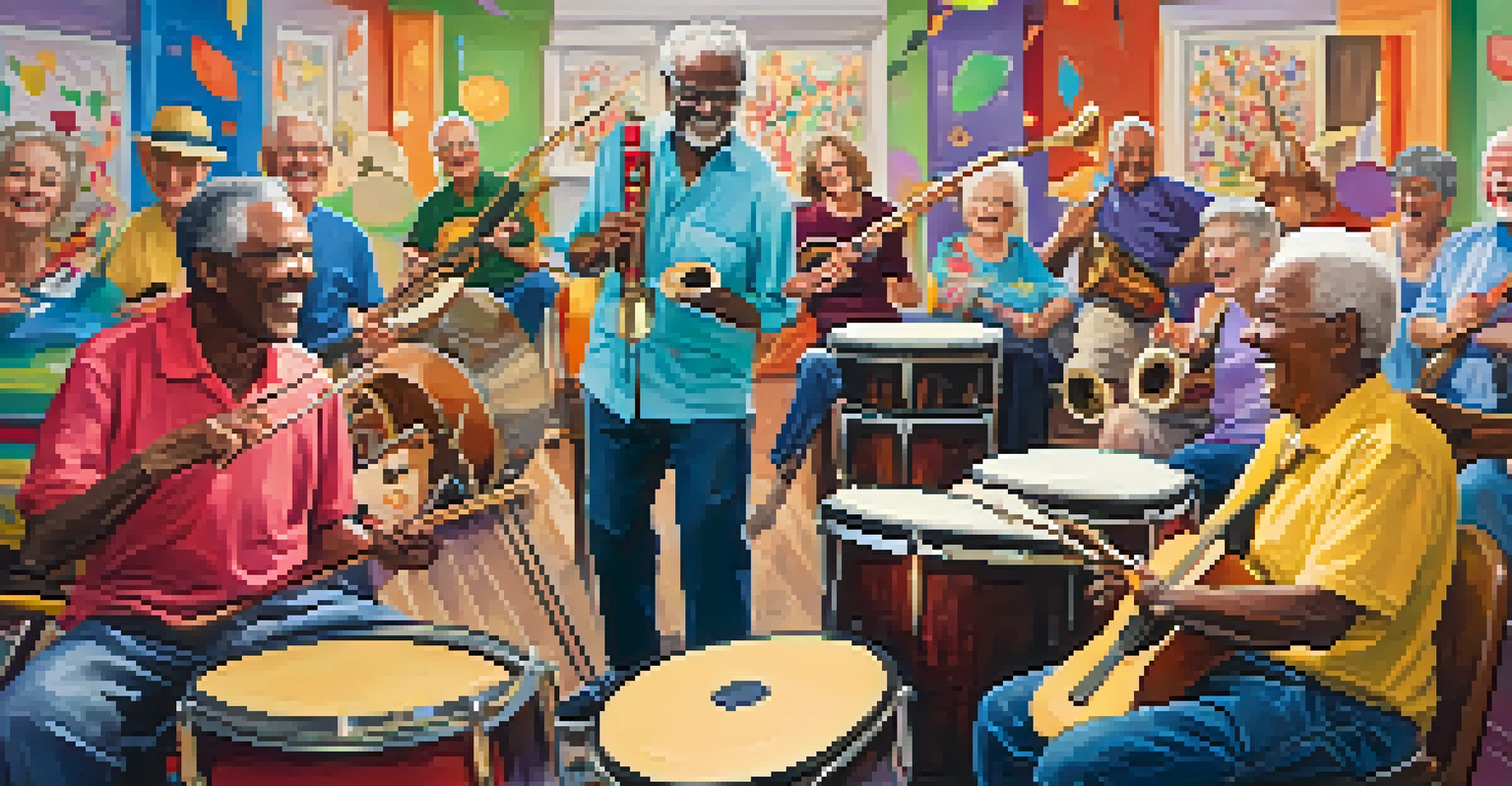Music and Aging: A Comprehensive Review of Existing Research

Understanding Music's Role in Cognitive Health for Seniors
Music has a unique ability to engage the brain, especially in older adults. Research shows that listening to or playing music can stimulate neural pathways associated with memory and cognition. This engagement can help combat cognitive decline, a common concern as we age.
Music can change the world because it can change people.
For instance, studies indicate that seniors who participate in musical activities may experience improved memory retention and even a delay in the onset of dementia symptoms. The familiar melodies can evoke memories, leading to emotional connections that support mental health.
Moreover, the act of creating music—whether through singing or playing an instrument—can further enhance cognitive function. This suggests that music isn’t just an art form; it’s a powerful tool for maintaining cognitive vitality in aging populations.
Emotional Benefits of Music for Older Adults
Music has a profound impact on emotions, and for older adults, it can be a source of comfort and joy. Listening to favorite songs can trigger positive memories and feelings, helping to alleviate symptoms of depression and anxiety. This emotional uplift is critical during a stage of life that may come with loneliness or loss.

For example, therapy sessions that incorporate music have shown significant success in enhancing mood and emotional well-being among seniors. These sessions provide a safe space to express emotions, connect with others, and foster a sense of community.
Music Boosts Cognitive Health
Engaging with music can stimulate neural pathways in older adults, potentially delaying cognitive decline and improving memory retention.
Furthermore, engaging with music can lead to increased social interaction. Whether through group classes or informal gatherings, these connections can reduce feelings of isolation, promoting overall mental health.
The Impact of Music on Physical Health in Aging
Music isn't just about the mind and emotions; it plays a role in physical health too. Studies have demonstrated that music can motivate older adults to engage in physical activity, whether it's dancing, walking, or exercising. The rhythm and beat can enhance coordination and balance, important factors in preventing falls.
Where words fail, music speaks.
Additionally, music therapy has been used to help manage pain and promote relaxation in older individuals. Listening to soothing music can lower stress levels and reduce the perception of pain, which is particularly beneficial for those dealing with chronic conditions.
Moreover, musical activities can enhance motor skills. Playing an instrument or participating in rhythm-based exercises can improve fine motor coordination, making daily activities easier and more enjoyable for seniors.
Music and Memory: A Deep Dive into Research Findings
One of the most fascinating aspects of music and aging is its impact on memory. Research shows that familiar tunes can evoke vivid memories, often more effectively than other stimuli. This phenomenon is particularly evident in individuals with Alzheimer’s or other forms of dementia.
Studies have found that when patients listen to music from their past, they may recall specific memories and even engage in conversation more readily. This suggests that music can serve as a powerful cue for memory retrieval, providing a bridge to the past.
Emotional Uplift Through Music
Listening to favorite songs can evoke positive memories and feelings, helping to alleviate symptoms of depression and anxiety in seniors.
Additionally, music therapy is being explored as a potential intervention for memory care. By integrating music into therapy, caregivers can enhance communication and improve the quality of life for those experiencing memory loss.
The Role of Music in Enhancing Quality of Life
Quality of life is a crucial consideration for aging individuals, and music can play a significant role in enhancing it. Engaging with music can provide enjoyment, a sense of purpose, and fulfillment. This is particularly important as older adults seek to maintain an active and meaningful lifestyle.
Participating in music-related activities—be it singing in a choir or attending concerts—can create a sense of belonging and shared experience. These social interactions are vital for emotional health and overall well-being.
Furthermore, music can serve as a form of self-expression. For many seniors, writing songs or playing music can be a creative outlet that fosters a sense of achievement and personal identity.
Practical Ways to Incorporate Music into Daily Life
Incorporating music into daily routines can be simple and rewarding. Creating playlists of favorite songs can evoke joyful memories and provide a soundtrack for everyday activities like cooking, cleaning, or exercising. This small change can significantly boost mood and energy levels.
Joining a local music group or class can also be a great way for older adults to connect with others. Whether it's a choir, a band, or a dance class, these activities foster community and provide opportunities for social interaction.
Physical Health Benefits of Music
Music can motivate older adults to engage in physical activity and has been shown to help manage pain and improve motor skills.
Additionally, family members can play a vital role by sharing music with their loved ones. Listening to music together or reminiscing about songs from the past can strengthen bonds and create cherished moments.
Future Research Directions in Music and Aging Studies
As the field of gerontology evolves, so too does the research on music and aging. Future studies are likely to focus on the long-term benefits of musical engagement, exploring how consistent participation in music activities can affect health outcomes over time.
Additionally, researchers may investigate the specific types of music that yield the best results for various demographics. Understanding how different genres impact mood, memory, and cognitive function can lead to more tailored interventions.

Moreover, there's a growing interest in the use of technology in music therapy. Virtual reality and music-based apps could enhance accessibility, allowing more seniors to benefit from the positive effects of music, regardless of their physical or geographical limitations.